Unit7 Living with disease
- 格式:doc
- 大小:118.00 KB
- 文档页数:30
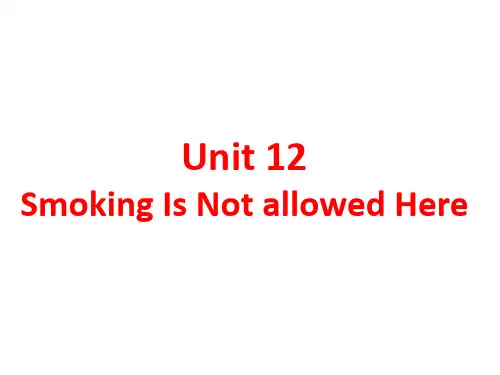
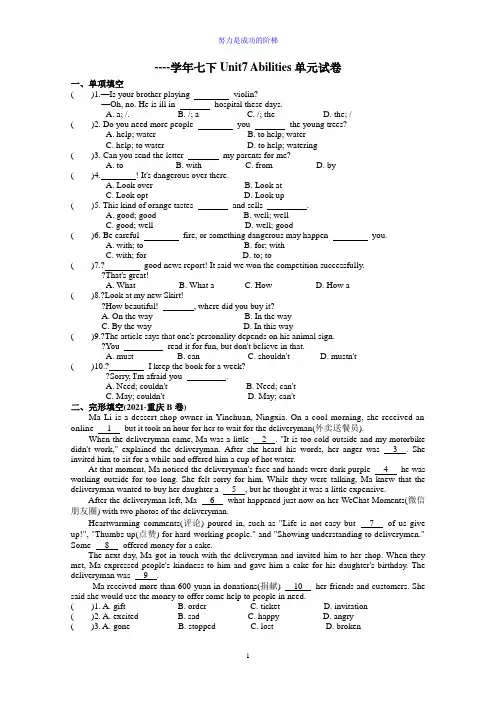
----学年七下Unit7 Abilities单元试卷一、单项填空( )1.—Is your brother playing violin?—Oh, no. He is ill in hospital these days.A. a; /.B. /; aC. /; theD. the; /( )2. Do you need more people you the young trees?A. help; waterB. to help; waterC. help; to waterD. to help; watering( )3. Can you send the letter my parents for me?A. toB. withC. fromD. by( )4. ! It's dangerous over there.A. Look overB. Look atC. Look optD. Look up( )5. This kind of orange tastes and sells .A. good; goodB. well; wellC. good; wellD. well; good( )6. Be careful fire, or something dangerous may happen you.A. with; toB. for; withC. with; forD. to; to( )7.? good news report! It said we won the competition successfully.?That's great!A. WhatB. What aC. HowD. How a( )8.?Look at my new Skirt!?How beautiful! , where did you buy it?A. On the wayB. In the wayC. By the wayD. In this way( )9.?The article says that one's personality depends on his animal sign.?You read it for fun, but don't believe in that.A. mustB. canC. shouldn'tD. mustn't( )10.? I keep the book for a week??Sorry, I'm afraid you .A. Need; couldn'tB. Need; can'tC. May; couldn'tD. May; can't二、完形填空(2021·重庆B卷)Ma Li is a dessert shop owner in Yinchuan, Ningxia. On a cool morning, she received an online 1 but it took an hour for her to wait for the deliveryman(外卖送餐员).When the deliveryman came, Ma was a little 2 . "It is too cold outside and my motorbike didn't work," explained the deliveryman. After she heard his words, her anger was 3 . She invited him to sit for a while and offered him a cup of hot water.At that moment, Ma noticed the deliveryman's face and hands were dark purple 4 he was working outside for too long. She felt sorry for him. While they were talking, Ma knew that the deliveryman wanted to buy her daughter a 5 , but he thought it was a little expensive.After the deliveryman left, Ma 6 what happened just now on her WeChat Moments(微信朋友圈) with two photos of the deliveryman.Heartwarming comments(评论) poured in, such as "Life is not easy but 7 of us give up!", "Thumbs up(点赞) for hard-working people." and "Showing understanding to deliverymen." Some 8 offered money for a cake.The next day, Ma got in touch with the deliveryman and invited him to her shop. When they met, Ma expressed people's kindness to him and gave him a cake for his daughter's birthday. The deliveryman was 9 .Ma received more than 600-yuan in donations(捐献) 10 her friends and customers. She said she would use the money to offer some help to people in need.( )1. A. gift B. order C. ticket D. invitation( )2. A. excited B. sad C. happy D. angry( )3. A. gone B. stopped C. lost D. broken( )4. A. because B. so C. when D. though( )5. A. schoolbag B. birthday cake C. new coat D. computer( )6. A. found B. remembered C. shared D. heard( )7. A. all B. each C. most D. none( )8. A. even B. never C. hardly D. ever( )9. A. helpful B. careful C. thankful D. wonderful( )10. A. to B. from C. with D. for三、阅读理解(A)(2021·枣庄)Friendships light up our lives. Everyone needs friends. Friends are very important. If you want to have good friends, you should be a good friend yourself first.When I was 5 years old, I had a lot of friends. Almost every kid liked to play with me because I always shared my toy cars with others. Never be mean(小气的) if you want to be a good friend.As an 11-year-old boy, I was captain(队长) of my soccer team. I was also the best player. At the beginning, I wasn't captain and I was the weakest player of the whole team. At that time, nobody wanted to make friends with me. Then I trained harder and harder. I made a lot of effort to catch up with the team. As the old saying goes?no pains, no gains. After a lot of hard work, I finally became a good player. My teammates wanted to make friends with me. If you want to be a good friend, always remember to make yourself stronger and stronger.Now I'm 14. My friends and I have a lot of stress at school. I'm good at Maths and one of my best friends is good at English. We often help each other. I help him make progress in Maths. It really does work! Many of my classmates who are bad at Maths corns to ask me for help. They become my friend as well…Be a helpful study fellow(伙伴) if you want to be a good friend. Make yourself into a good friend and you'll never walk alone.( )1. What's one supposed to do first to have good friends according to the writer?A. Become the best soccer player of the team.B. Make himself/herself stronger than others.C. Help others study Maths or English.D. Become a good friend himself herself.( )2. What can be inferred from the passage?A. One should be honest when making friends.B. It's not easy to make friends when one does well in Maths.C. Those who are stronger than others have more friends.D. The writer hasn't any stress while making friends with others.( )3. What can be the best title For the passage?A. The importance of FriendsB. The Ways of Making FriendsC. The Advantages of Being CaptainD. The Suggestions of Dealing with Stress(B)I saved the grain carefully and finally had enough to plant. I built a wall around my garden to keep the wild goats away.Then when my crop bore its fruit, the birds discovered it. The birds were not afraid of my dog at all. I shot them but as soon as I walked away, they returned. At last, I killed some birds and hung there among the crop, hoping they would serve as the scarecrows, which turned out to be successful. By harvest time, I had nearly two bushels(蒲式耳) of rice and two and a half bushels of wheat.With my new grain to store, I found a new problem. The fine grain ran through my baskets. It took me nearly two months to form and dry two ugly pots—one for rice and one for wheat.Next I formed a clay oven and made some other tools from hard wood and cloth to bake bread.I made and baked bread in my oven. I spent the third year on the island in farming and baking.Soon after that, I began to think of my days sailing in a tidy boat with Xury. I wished to have a boat and explore the island by sea.I tried to turn over the ship's boat that I had seen washed up, but failed. I was still determined to have a boat. So I chose a strong tree and spent weeks cutting it down. Then it took me months to turn it from tree to boat.When it was time to launch, I realized I had made my boat too far from the nearest stream. The boat was far too heavy for me to move. I tried bringing the water to the boat instead of the boat tothe water. I soon saw it would take me twenty years of constant labor.I celebrated my Fourth year on the island with two boats, but I was no closer to a sea journey.?Taken from The Adventures of Robinson Crusoe ( )4. What does "a new problem" in Paragraph 3 refer to?A. How to plant grain.B. How to make pots.C. Haw to store grain.D. How to fix the baskets.( )5. By the last sentence "I was no closer to a sea journey", the writer means " ".A. I was getting closer and closer to the seaB. I was getting farther and farther from the seaC. It was possible for me to have a sea journey in my boatsD. It was still impossible for me to explore the island by sea( )6. What can we infer from the passage?A. I managed to turn over the ship's boat.B. I spent months bringing the boat to the nearest stream.C. I tried to salve the problems with my courage and wisdom.D. I spent the third year on the island in farming and baking.四、信息还原(2021,鞍山)A: Hello, Bob. You look upset. 1B: I didn't pass my English test. I'm under too much pressure because of my study.A: 2 How about playing basketball with me?B: Sorry, I can't. I have to go home and help my mother with some housework.A: 3B: Yes, my parents are busy, so I want to help them.A: Great! What do you often help do?B: Just some simple things, like doing the dishes and making the bed. 4A: Of course. How about this Sunday?B: OK. 5A: In my house at ten o'clock. See you then.根据下列句子所给汉语注释或首字母,写出空缺处各单词的正确形式。
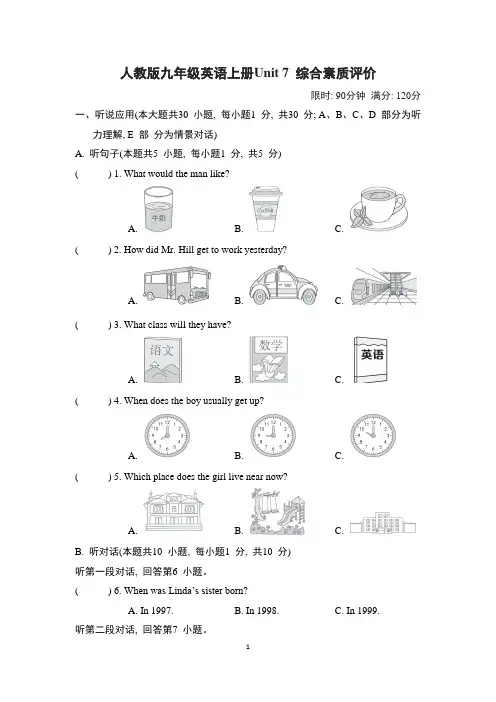
人教版九年级英语上册Unit 7 综合素质评价限时: 90分钟满分: 120分一、听说应用(本大题共30 小题, 每小题1 分, 共30 分; A、B、C、D 部分为听力理解, E 部分为情景对话)A. 听句子(本题共5 小题, 每小题1 分, 共5 分)( ) 1. What would the man like?A. B. C.( ) 2. How did Mr. Hill get to work yesterday?A. B. C.( ) 3. What class will they have?A. B. C.( ) 4. When does the boy usually get up?A. B. C.( ) 5. Which place does the girl live near now?A. B. C.B. 听对话(本题共10 小题, 每小题1 分, 共10 分)听第一段对话, 回答第6 小题。
( ) 6. When was Linda’s sister born?A. In 1997.B. In 1998.C. In 1999.听第二段对话, 回答第7 小题。
( ) 7. What clothes must Tom wear when he goes to school?A. The school uniform.B. His own clothes.C. A white shirt.听第三段对话, 回答第8 小题。
( ) 8. What does Jeff want to be in the future?A. A scientist.B. A teacher.C. A doctor.听第四段对话, 回答第9 小题。
( ) 9. When did Ben begin to do his homework?A. At 7:30.B. At 8:00.C. At 8:30.听第五段对话, 回答第10 小题。
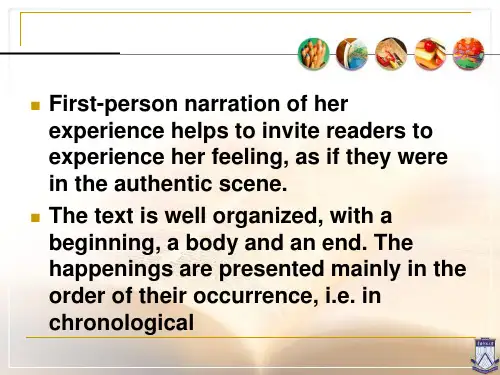
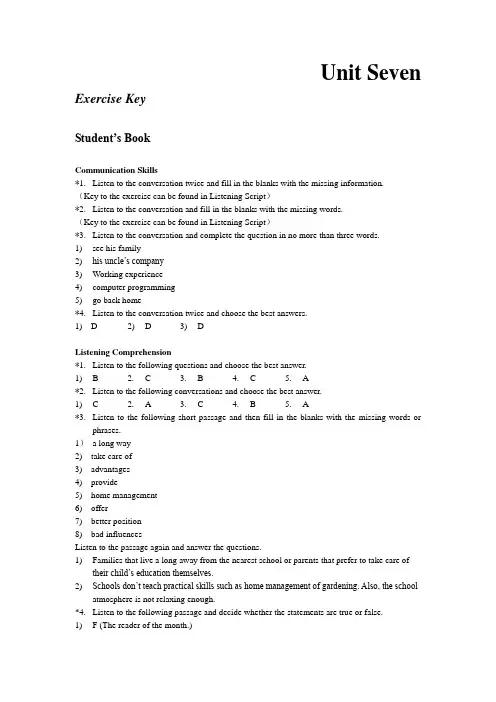
Unit Seven Exercise KeyStudent’s BookCommunication Skills*1. Listen to the conversation twice and fill in the blanks with the missing information.(Key to the exercise can be found in Listening Script)*2. Listen to the conversation and fill in the blanks with the missing words.(Key to the exercise can be found in Listening Script)*3. Listen to the conversation and complete the question in no more than three words.1) see his family2) his uncle’s company3) Working experience4) computer programming5) go back home*4. Listen to the conversation twice and choose the best answers.1) D 2) D 3) DListening Comprehension*1. Listen to the following questions and choose the best answer.1) B 2. C 3. B 4. C 5. A*2. Listen to the following conversations and choose the best answer.1) C 2. A 3. C 4. B 5. A*3. Listen to the following short passage and then fill in the blanks with the missing words or phrases.1)a long way2) take care of3) advantages4) provide5) home management6) offer7) better position8) bad influencesListen to the passage again and answer the questions.1) Families that live a long away from the nearest school or parents that prefer to take care oftheir child’s education themselves.2) Schools don’t teach practical skills such as home management of gardening. Also, the schoolatmosphere is not relaxing enough.*4. Listen to the following passage and decide whether the statements are true or false.1) F (The reader of the month.)2) F (She is in the 5th grade of Harvey Primary School.)3) T (She lives with her mom, dad, and three brothers.)4) F (Through reading, she can visit new places, travel to different periods of time, and learnabout other people.)5) F (It can be inferred from the last sentence that this is a speech given at a celebration.)Text A*2. Answering Questions1) Mrs. Bush admired her second grade teacher Miss Gnagy so much that she wanted to becomea teacher like her one day.2) She would create her own imaginary classroom in which to teach her dolls.3) She felt that she was unprepared for the job, and she felt that it was more difficult than shehad imagined.4) With a group of students -- both quiet and fidgety children, and a class clown, Mrs. Bush hadto find ways to direct class so that all the students received the attention they needed.5) As a teacher, Mrs. Bush found that students had different levels of interest, energy, andattention. She realized that she had a rather short amount of time to teach important skills to her students, skills that she believed they would use throughout their lives.6) Although Mrs. Bush had instruction to teach students to read, she did not know how to put itin to practice.7) A) Witnessing a child’s development into a young reader; B) watching students’ eyes light upwith understanding; C) knowing that she was playing some part in ensuring their future success.8) A) Some students have an advantage by having strong pre-reading skills when they enterschool. B) New studies show success in early school strongly correlates to how often parents have spent time with their children on reading and language activities.9) Repetition of the rhythm of speech is important to help the developing brain understand howlanguage is organized.10) Reading motivates and inspires and sparks the imagination in a way that television cannot.Language Focus*1. Words1)technique2)beyond3)appreciate4)meaningful5)relatively6)ensure7)amount8)obvious9)success10)totally★2. Phrases1)work its spell on2)in practice3)be sure of4)admired John for5)One day6)in public7) In a way8) make much difference9)play an important part in10) light up★3. Structure1) The researchers say this makes the test cheap enough to be used in developing countries.2) He said it was the first time he had seen the enemy close enough to shoot at.3) You need a roof strong enough to support the weight of a small garden.4) The doctors say Mr. Smith should be well enough to carry out his duties as president of thecommittee after the operation.5) He says they will be able to create a medicine that is strong enough to prevent the disease.6) Some women's groups felt the meeting did not go far enough to guarantee women's rights.★4. Word Formation1)enclosed2)enable3)enrich4)encourages5)endangering6)enlarge★5. Translation1) The government urges the public to play a part in caring for the poor in our society.2) Your technique in public relations will one day be recognized.3) In a way, the impact of education on children is something that many people don't appreciate.4) How often parents spend time on reading with their very young children makes a hugedifference in childhood development.5) You must be sure of what you want to achieve before you sit down and talk with them.6) Nursery rhymes can be meaningful as they can stretch the boundaries of imagination forchildren.Translate the following sentences into Chinese.3)尽管拥有教育学学位并有过教学实习,我还是感到没有做好充分的教学准备——这工作比我预料的要艰难得多。
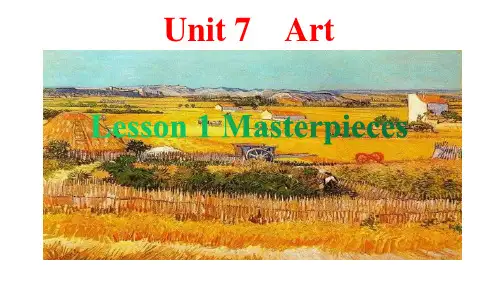

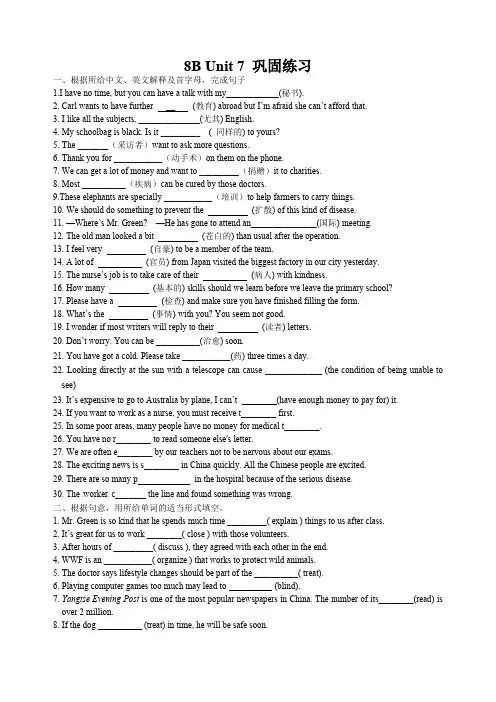
8B Unit 7 巩固练习一、根据所给中文、英文解释及首字母,完成句子1.I have no time, but you can have a talk with my____________(秘书).2. Carl wants to have further __ (教育) abroad but I’m afraid she can’t afford that.3. I like all the subjects, ______________(尤其) English.4. My schoolbag is black. Is it _________ ( 同样的) to yours?5. The _______(采访者)want to ask more questions.6. Thank you for ___________(动手术)on them on the phone.7. We can get a lot of money and want to _________(捐赠)it to charities.8. Most __________(疾病)can be cured by those doctors.9.These elephants are specially ___________(培训)to help farmers to carry things.10. We should do something to prevent the (扩散) of this kind of disease.11. —Where’s Mr. Green? —He has gone to attend an_______________(国际) meeting.12. The old man looked a bit (苍白的) than usual after the operation.13. I feel very (自豪) to be a member of the team.14. A lot of (官员) from Japan visited the biggest factory in our city yesterday.15. The nurse’s job is to take care of their (病人) with kindness.16. How many (基本的) skills should we learn before we leave the primary school?17. Please have a (检查) and make sure you have finished filling the form.18. What’s the (事情) with you? You seem not good.19. I wonder if most writers will reply to their (读者) letters.20. Don’t worry. You can be __________(治愈) soon.21. You have got a cold. Please take ___________(药) three times a day.22. Looking directly at the sun with a telescope can cause _____________ (the condition of being unable to see)23. It’s expensive to go to Australia by plane, I can’t (have enough money to pay for) it.24. If you want to work as a nurse, you must receive t________ first.25. In some poor areas, many people have no money for medical t________.26. You have no r________ to read someone else's letter.27. We are often e________ by our teachers not to be nervous about our exams.28. The exciting news is s________ in China quickly. All the Chinese people are excited.29. There are so many p in the hospital because of the serious disease.30. The worker c_______ the line and found something was wrong.二、根据句意,用所给单词的适当形式填空。
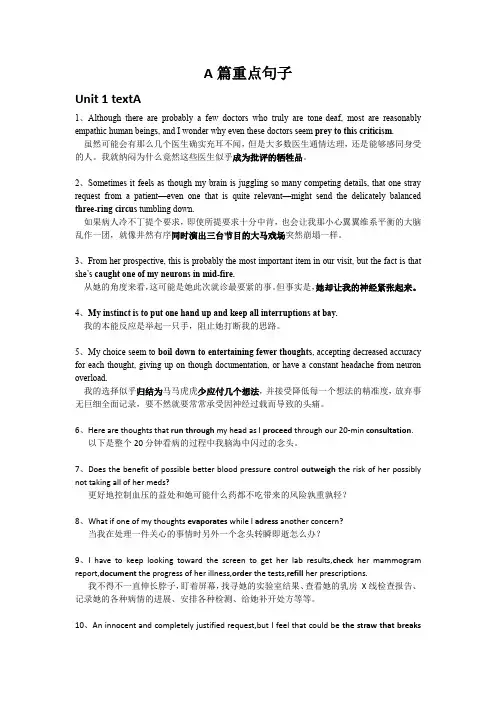
A篇重点句子Unit 1 textA1、Although there are probably a few doctors who truly are tone-deaf, most are reasonably empathic human beings, and I wonder why even these doctors seem prey to this criticism.虽然可能会有那么几个医生确实充耳不闻,但是大多数医生通情达理,还是能够感同身受的人。
我就纳闷为什么竟然这些医生似乎成为批评的牺牲品。
2、Sometimes it feels as though my brain is juggling so many competing details, that one stray request from a patient—even one that is quite relevant—might send the delicately balanced three-ring circus tumbling down.如果病人冷不丁提个要求,即使所提要求十分中肯,也会让我那小心翼翼维系平衡的大脑乱作一团,就像井然有序同时演出三台节目的大马戏场突然崩塌一样。
3、From her prospective, this is probably the most important item in our visit, but the fact is that she’s caught one of my neurons in mid-fire.从她的角度来看,这可能是她此次就诊最要紧的事。
但事实是,她却让我的神经紧张起来。
4、My instinct is to put one hand up and keep all interruptions at bay.我的本能反应是举起一只手,阻止她打断我的思路。
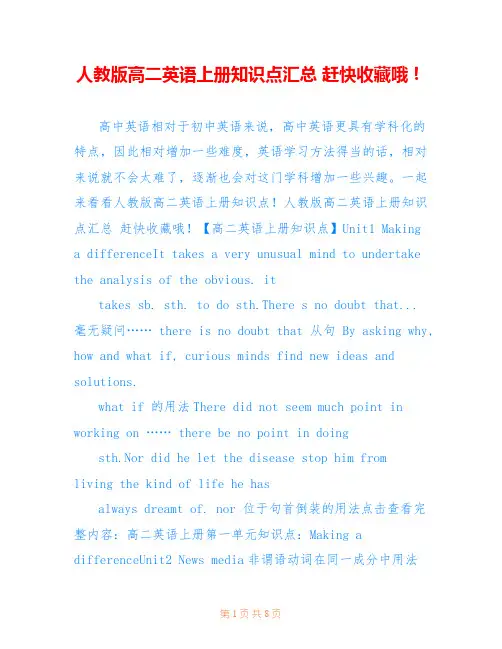
人教版高二英语上册知识点汇总赶快收藏哦!高中英语相对于初中英语来说,高中英语更具有学科化的特点,因此相对增加一些难度,英语学习方法得当的话,相对来说就不会太难了,逐渐也会对这门学科增加一些兴趣。
一起来看看人教版高二英语上册知识点!人教版高二英语上册知识点汇总赶快收藏哦!【高二英语上册知识点】Unit1 Making a differenceIt takes a very unusual mind to undertake the analysis of the obvious. ittakes sb. sth. to do sth.There s no doubt that...毫无疑问…… there is no doubt that 从句By asking why, how and what if, curious minds find new ideas and solutions.what if 的用法There did not seem much point in working on …… there be no point in doingsth.Nor did he let the disease stop him fromliving the kind of life he hasalways dreamt of. nor 位于句首倒装的用法点击查看完整内容:高二英语上册第一单元知识点:Making a differenceUnit2 News media非谓语动词在同一成分中用法的辨析1.做主语:-般来说,不定式和动名词成份相同时,表示客观性、一般性行为为多用动名词表示,而表示一次性、具体性行为则多用不定式。
Looking after children is her job.To clean the classroom is his job today.2.做宾语:I like swimming, but I don t like to swim today because I don t feelwell.(1).有些动词只能接不定式做宾语,这些动词接上不定式,含有明显的主观性和将来性意义。
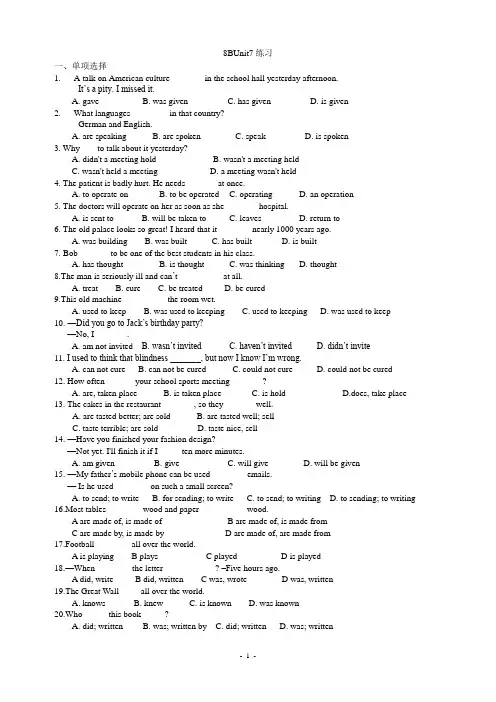
8BUnit7练习一、单项选择1. --- A talk on American culture _______ in the school hall yesterday afternoon.--- It’s a pity. I missed it.A. gaveB. was givenC. has givenD. is given2. --- What languages ________ in that country?--- German and English.A. are speakingB. are spokenC. speakD. is spoken3. Why ___ to talk about it yesterday?A. didn't a meeting holdB. wasn't a meeting heldC. wasn't held a meetingD. a meeting wasn't held4. The patient is badly hurt. He needs_______ at once.A. to operate onB. to be operatedC. operatingD. an operation5. The doctors will operate on her as soon as she _______ hospital.A. is sent toB. will be taken toC. leavesD. return to6. The old palace looks so great! I heard that it _______ nearly 1000 years ago.A. was buildingB. was builtC. has builtD. is built7. Bob_______ to be one of the best students in his class.A. has thoughtB. is thoughtC. was thinkingD. thought8.The man is seriously ill and can’t __________at all.A. treatB. cureC. be treatedD. be cured9.This old machine __________the room wet.A. used to keepB. was used to keepingC. used to keepingD. was used to keep10. —Did you go to Jack’s birthday party?—No, I _______.A. am not invitedB. wasn’t invitedC. haven’t invitedD. didn’t invite11. I used to think that blindness _______, but now I know I’m wrong.A. can not cureB. can not be curedC. could not cureD. could not be cured12. How often ______ your school sports meeting _______?A. are, taken placeB. is taken placeC. is holdD.does, take place13. The cakes in the restaurant _______, so they _______well.A. are tasted better; are soldB. are tasted well; sellC. taste terrible; are soldD. taste nice, sell14. —Have you finished your fashion design?—Not yet. I'll finish it if I _____ten more minutes.A. am givenB. giveC. will giveD. will be given15. —My father’s mobile phone can be used________ emails.— Is he used________ on such a small screen?A. to send; to writeB. for sending; to writeC. to send; to writingD. to sending; to writing16.Most tables________ wood and paper __________ wood.A are made of, is made ofB are made of, is made fromC are made by, is made byD are made of, are made from17.Football________ all over the world.A is playingB playsC playedD is played18.—When________ the letter____________? –Five hours ago.A did, writeB did, writtenC was, wroteD was, written19.The Great Wall ____ all over the world.A. knowsB. knewC. is knownD. was known20.Who _____ this book _____?A. did; writtenB. was; written byC. did; writtenD. was; written21.A story _____ by Granny yesterday.A. was told usB. was told to usC. is told usD. told us22.The monkey was seen _____ off the tree.A. jumpB. jumpsC. jumpedD. to jump23. An accident ____ on this road last week.A.has been happenedB. was happenedC. is happenedD. happened24.The school bag ___ behind the chair.A. putsB. can be putC. can be puttedD. can put25.Older people ____ well.A. looks afterB. must be looked afterC. must look afterD. looked after26.Our teacher ______ carefully.A. should be listened toB. should be listenC. be listenedD. is listened二.根据句意.所给汉语或首字母写出单词。
Unit 7 听力原文Part IB1. A: Do you know how many teeth you’ve got?B: How many teeth? Ooh, ooh. 24? More? (A: Yes) 32?A: Yes.2. A: Do you know how many bones there are in your body?B: How many bones? I'll take a guess. 153.A: 2063. A: How often does your heart beat?B: 98 times a minute.A: No, 70 times a minute.4. Bob: Do you know what the boss thinks you should do, Billy?Billy: Just you keep your great nose out of this, Bob, will you?(Meaning: not interfere in)5. Anne: Steven Kent, I never, never want to see you in my life again.Steven: Oh no.Mary: You really have put your foot in it, haven't you?(Meaning: cause embarrassment by doing or saying sth. tactless)6. Kate: Dave! Can you give me a hand, please?Dave: What?Kate: I said can you give me a hand.Dave: All right, I'm coming. No need to shout.(Meaning: ask for help)7. Max: Are there any jobs going in your company then, for an intelligent, hard-working youngman like my son Julian?Frank: No, I haven't heard of any at all recently.Max: Well, could you keep your ears open, just in case?(Meaning: listen with care)8. Carol: Have you heard about Maggie then?Norma: Maggie? Maggie Thatcher?Carol: No. Maggie Brown. She's in love again.Norma: Oh not again. Who with this time?Carol: With her boss. Head over heels in love with him, she is.(Meaning: completely)9. Nick: Have you ever lent any money to Mick?Jill: Mick? Huh! I wouldn't lend him any if I were you.Nick: Why not? Doesn't he pay it back?Jill: No. Never. He's up to his neck in debts.(Meaning: deeply involved in)10. Liz: She's a very good doctor. Never looks at her watch. Never complains. Nothing's too muchtrouble for her.Pat: I know, yeah. Not many like her about. She's all heart, really. All heart.(Meaning: with the deepest devotion)CNobody's really sure why people go bald, but some scientists believe that people may inherit baldness. If you are interested, check out your mother' father. Your hairline may look like his when you get older. Now listen to this radio phone-in. Complete the following chart.check out:查查hairline:发线comb hair:梳头shampoo:洗发bald:秃顶baldness:秃头ridiculous:可笑patch:部分,区域wig:假发Radio presenter: All right. Thank you for that call, Rosemary. We go now, I think, to Glasgow and our next caller, er, Jim Baillie. Hello Jim.Jim: Hello?Radio presenter: Hello Jim. What's your problem?Jim:Er … well I'm er … beginning to lose my hair. Er, I went to the doctor, but he just said there was nothing I can do about it. He said it was probably hereditary. My father was bald by the time he was thirty.Maurice: Hello, Jim. And how old are you?Jim: Me. I'm twenty-eight.Maurice: And are you losing a lot of hair, then?Jim: Well, it comes out a lot when I comb my hair and you can see a thin part on the top of my head.Maurice: And does that really worry you, jim?Jim: Well. I don't like it. It's old … you know … looks old … I don't want to look like a middle-aged man at twenty-eight. And I wondered if there was some special shampoo I should use … if you could tell me one that I should buy … something like that … you know … to stop it getting worse.Maurice: Well, you know, Jim, to be honest with you there's not really a lot you can do about it, actually, I'm afraid. I mean, baldness is one of those things that, in my experience, you just have to try to accept. Some men find it more difficult to accept baldness than others …Tessa: There is one piece of advice, though, Jim, and that's don't try to comb your hair over the bald or thin patch. Don't try to hide it. Whatever you do, don't comb it over because that usually looks ridiculous. And the other thing that usually looks ridiculous is a man with a wig. Don't let anyone persuade you to buy one of those false hairpiece things, because they usually look much worse than a bald man. I actually think bald men can look very attractive. My husband's bald and I think it really suits him.Part II The digestive system and diarrheaThe human body is a highly complex self-generator, that is to say, provided it is given the right fuel, it is capable of both curing and warding off disease. The food we eat helps to give us energy. It has a long journey to make before all its goodness has been taken into our body. The food takes up to six hours to be digested in the stomach, depending on the size of the meal. Thecomplete digestive process takes about 24 hours. But sometimes the system can go wrong.complex:复杂self-generator:自愈(体)provided:假设fuel:燃料warding off:避免digest:消化digestion:消化digestive process:消化过程digestive system:消化系统stomach:胃over-tax:课税过重;负担过重insufficiently:不够,不能胜任grind to a halt:慢慢减速到停止;陷入停顿rusty:生锈的,腐蚀的coil up:缭绕mechanism:机制,机能sluggish:行动迟缓的,反应慢的abdomen:肚子efficiently:效率高地;有效地break down:损坏watery:含水的,水分多的squeeze:挤;榨muscle:肌肉irritable:易怒的,急躁的;过敏的;应激性的;毛躁dehydrate:使脱水,使干燥gut:肠子;勇气;内脏;直觉;reasonable:合理的,公道的irritate:刺激,使兴奋;bowel:肠;内部;同情心,怜悯心obviously:明显clear up:清除intestine:肠enzyme:酶feces:粪,屎,渣滓;粪便symptom:症状;征兆diarrhea:腹泻constipation:便秘contaminated food:污染的食物virus:病毒parasite:寄生虫dehydration:脱水;干燥,极度口渴;失水fluid:液体,流体life saver:救生者bacteria:细菌syndrome:综合征;综合症状;典型表现tummy pains:胃/肚子痛a pinch of:一撮,少许AOur body is made up of thousands of different parts. All these parts work together to keep us alive and to help us move around. The parts of the human body are like the parts of a very complicated machine. Like any other machine, however, if it is inexpertly cared for, over-taxed or insufficiently used, it will become rusty, sluggish or clogged and parts of its mechanism may even grind to a halt. That is why it is so important to keep every part of the human machine healthy and properly cared for. To keep in good running order, the body requires the raw materials for growth and the replacement of tissues when necessary. Our bodies burn food like fuel to produce the energy we need.The human digestive system is a bit like a very long tube, but it's a lot more complex. It's several meters long, and most of it is carefully coiled up in our abdomen. It has several important jobs to do.First, it must digest or break down our food. Digestion starts the moment food enters our mouth. Then it continues as the food is squeezed along the gut by muscles in the wall of the intestine. As the food travels through the gut, natural chemicals called enzymes are added to it, which help break down the food. Then this digested food and water must be absorbed from the gut into our blood stream so that it can be used by the body. Finally, the gut must carry away any waste products in the form of feces.Usually our intestine does all these things very efficiently. But sometimes things can go wrong. Probably the most common gut symptoms are diarrhea and constipation.With diarrhea, the food and water travels too quickly through the intestine, often making the feces watery, and making it necessary to open the bowels more frequently.There are lots of causes of diarrhea. Probably the commonest causes of diarrhea are contaminated food or water, and infection caused by viruses or parasites.Many cases of diarrhea clear up within a few days without any special medicines. But the body loses a lot of fluid through diarrhea, so there is a very real risk of the body drying out or becoming dehydrated. Because of this risk of dehydration, the best treatment for diarrhea is simply to make sure you are drinking enough. Avoiding dehydration in this way can be a life saver.BThere are lots of different causes of diarrhea. Um, there are infections that can happen, and this is food poisoning, if you like, where in your food you eat some sort of bacteria or organisms, which infect you. Some foods can just irritate the gut and tend to give you diarrhea, although they are not infected. It's just the food itself (that) might irritate your system. Some people, if they get very nervous and stressed about something, find they tend to get diarrhea. Something called the irritable bowel syndrome where something goes wrong with the way the gut works. And people that suffer from this tend to get, um, tummy pains, and they get sometimes diarrhea, sometimes constipation. All sorts of causes.Most attacks of diarrhea, um, particularly in adults, are not serious and they clear up by themselves within one or two days. The most important thing is to drink lots of fluid, because if you have got diarrhea, you're obviously losing a lot of fluid. And so it's better really not to eat toomuch, not to worry about that, but to make sure you drink plenty of fluid. And ideally, this should have a little bit of salt and sugar in. You can get special rehydrating fluids, which are specially mixed. But if you want to make your own by adding just a teaspoonful of sugar and a pinch of salt, then it's obviously perfectly reasonable to do that.Part III ImmunityThe environment contains many potentially destructive microorganisms. It is impossible for us to avoid contact with microbes. That's why our body is constantly under attack from invading germs and infections. Then why don't we suffer from constant illness? Do we have our own defense system?B.potentially:潜在地destructive:破坏性的microorganisms:微生物impossible:不可能microbes:微生物,细菌invading germs:侵入的细菌suffer from:生病;忍受defense system:防护系统lash:鞭挞,鞭子;责骂;讽刺;眼睫毛immunity:免疫constant (ly):持续come into play:起作用germ:细菌literally:字面上assist:帮助reserve:保存,储备,储存backup:支持,后援;阻塞;(计)备份文件bone marrow:骨髓antibody:抗体measles:麻疹polio:脊髓灰质炎;小儿麻痹症tuberculosis:肺结核The human body is constantly under attack from invading germs and infections. And the only reason we don't suffer from constant illness is our bodies have their own defense mechanism to fight off disease. This resistance to infection is called immunity.A: How does immunity work?B: Well, the immune system is the body's own secret army, which fights infection. And it consists of a whole range of troops, soldiers, their cells and their molecules. Now the headquarters of this army is really the blood. That's where it does most of its fighting. And sometimes it needs some reserve, and that comes from the bone marrow. That's where the immune cells are made.A: So there are many different kinds of cells, different kinds of molecules in the immune system. I guessed the ones that we're probably more familiar with are white blood cells.B: That's right. White blood cells form a major part of the body's defense. But there are also antibodies in their life, more proteins. They just lash onto the invaders. The white cells cansometimes actually gobble up invaders. The clever thing is that once the infection has attacked our body, the immune system seems to have a memory of the invader, so that the next time it sees the invader it can attack very quickly.A: There are some things which we're not naturally immune to and that's where vaccination comes in, isn't it?B: Exactly. Vaccination plays on the body's ability to remember infection. So what happens is that someone is given a version of an illness, for instance, measles or polio, or tuberculosis, and the body thinks that it is actually being infected with that infection. And the next time it sees it, the body can respond very quickly. All the troops of its immune system can come into play.A: Now sometimes the immune system doesn't work very well, does it?B:No. It’s a remarkably complex system. And sometimes it can go wrong. Either it can be overactive, so it actually starts to attack our own body self, or it can be underactive sometimes, and we are more likely to be infected in that situation.A: Are there any important illnesses which result from the immune system so that it's turning on our bodies themselves?B: There are. One example would be a disease like multiple-sclerosis, where the body's own immune system attacks the lining of nerves, which means that people's nerves don't work properly. A: We're able to assist the body in its fight against the illness in many cases, but there are some diseases which we don't seem to be able to produce a vaccine for. AIDS is one of them. Why not? B: The problem is AIDS, which is caused by the HIV virus, attacks the human immune system, which means that our normal defenses aren't there to fight off that infection. The other problem with trying to produce a vaccine against HIV or AIDS is that the virus, HIV, can change itself so easily. That's very difficult to find a vaccine which can recognize all the different types of HIV. So one vaccine may be effective against one type of the virus but it may absolutely be no good for another type.C.Presenter: The human body is constantly under attack from invading germs and infections. And the only reason we don't suffer from constant illness is our bodies have their own defense mechanism to fight off disease. This resistance to infection is called immunity. And here with me to discuss how it works is Grime Easton. He is a family doctor, and a member of the Science In It here in the BBC World Service. Grime, how does immunity work?Grime: Well, the immune system is the body's own secret army, if you like, which fights infection. And it consists of a whole range of troops, soldiers, their cells and their molecules. Um, now the headquarters of this army is really the blood. That's where it does most of the fighting. And sometimes it needs some reserve, some backup, and that comes from the bone marrow. That's where the immune cells' factories are.Presenter: So there are many different kinds of cells, and different kinds of molecules tied up in the immune system. I guessed the ones that we're probably more familiar with are white blood cells.Grime: That's right. White blood cells form a major part of the body's defense. But there are also antibodies in their life, more proteins, which just lash onto the invaders. Um, but, as you say, the white cells can sometimes actually gobble up invaders. So the clever thing is that once the infection has attacked our body, the immune system seems to have a memory of the invader, so that the next time it sees the invader it can attack very quickly. The immune system in the humanbody fights invading disease. Immunity occurs because the immune system can remember the chemical makeup of invading germs and attack them very quickly.Presenter:There are some things which we're not naturally immune to and that's where vaccination comes in, isn't it?Grime: Exactly. Vaccination plays on the body's ability to remember infection. So what happens is that someone is given a version of an illness, for instance, measles or polio, or tuberculosis, and the body thinks that it is actually being infected with that infection. And the next time it sees it, um, the body can respond very quickly. And all the troops of its immune system can come into play. Vaccination can be used to protect the body against specific infections.Presenter: Now sometimes the immune system doesn't work very well, does it?Grime: No. It's a remarkably complex system. It's a very complicated system. And sometimes it can go wrong. Either it can be overactive, so it actually starts to attack our own body self, or it can be underactive sometimes, and we are more likely to be infected in that situation.Presenter: Are there any important illnesses which result from the immune system so that it's turning on our bodies themselves?Grime: There are. And one example would be a disease like multiple-sclerosis, where the body's own immune system, we think, attacks the lining of nerves, which means that people's nerves don't work properly.Presenter: We're able to assist the body in its fight against the illness in many cases, but there are some diseases which we don't seem to be able to produce a vaccine for. Um, AIDS is one of them. Why not?Grime: Well, the problem is AIDS, which is caused by the HIV virus, is that HIV itself attacks the human immune system, which means that our normal defenses aren't there to fight off that infection, or indeed many other sorts of infection. The other problem with trying to produce a vaccine against HIV or AIDS is that the virus, HIV, can change itself so easily. Um, that's very difficult to find a vaccine which can recognize all the different types of HIV, which there are. So one vaccine may be effective against one type of the virus but it may absolutely be no good for another type.HIV is the virus that causes AIDS. HIV destroys the body's immune system, and puts the body at greater risk from other common infections.Presenter: I was talking to Dr. Grime Easton of the Science In It about immunity. The reason why he, I, and I hope you, are able to remain as healthy as we are.Part ⅣWhy do I catch coldsVirus are most definitely going to get you. And when they do, they will give you anything, from a cold to Ebola. And yet, technically, virus have no life of their own. So why do they cause so much trouble? More to the point, why do I catch colds?See that guy with the blocked nose. When he sneezes, 40,000 droplets will fly twelve feet in their air, infecting up to 150 people. You should have ducked. A cold virus just can’t live without you. With no cells of its own, it needs to take over your cells and replicate. Here’s something to think about. The virus can only travel around inside a blob of macus. And that mean whenever you catch a sniffle, someone else’s snot has been up your nose. Anyway, your immune system is constantly on the prowl for attackers like these. If it wasn’t, you could end up with fatal pneumonia. So, when it spots a viral invasion, it grabs a sample. Here, a T cell first identifies the invader and then deploys an army of tailor-made immune cells to your nose. These provide specialbackup for the standard immune cells already fighting your cold. Your nose has become a battleground. Meanwhile, to stop infection spreading to your lungs, you’re manufacturing a daily pint of macus. This snot gives you a headache. While the virus irritates your nose, so you have to blow it around 45 times a day. Beating a cold takes you about seven days and you’ll catch about four a year.This is the golden age for the cold virus. It hops on planes with its human hosts, visits new cities and finds hundreds of new homes with every sneeze. As it replicates, it mutates. So by the next year it may be back in a different form.Part V Dental HealthPeople have been troubled by tooth and gum problems for thousands of years. The earliest record of dental treatment comes from ancient Egypt. Books say the Egyptians treated gum swelling by using a substance made of spices and onions. The earliest known person to treat tooth problems was also from Egypt. He lived about five-thousand years ago. He was known as a "doctor of the tooth."Experts say Chinese people living almost five-thousand years ago treated tooth pain by acupuncture -- placing small sharp needles in different parts of the body. About one-thousand-three-hundred years ago, the Chinese filled holes in the teeth with a mixture of the metals mercury, silver and tin. That was almost one-thousand years before a similar substance was first used in western countries. Some ancient people like the Maya did not treat dental disease. But they made their teeth pretty by placing pieces of stone and metal on them.The ancient Romans were careful about keeping their teeth clean. More than two-thousand years ago, the Romans treated toothaches, filled holes in teeth, and made false teeth to replace those that had been lost.From the fifth to the fifteenth centuries, Europeans with tooth problems went to people called barber-surgeons. These people performed many services, including cutting hair, pulling teeth and treating medical conditions. Dental treatment improved during the fourteenth and fifteenth centuries as doctors increased their knowledge about teeth.Modern dentistry began in the Seventeen-Hundreds in France. That was when Pierre Fauchard published his book called "The Surgeon Dentist." It was the first book about dental science. The book provided information about dental problems for other dentists to use. And it described ways to keep teeth healthy. Pierre Fauchard is considered the father of modern dentistry. His work was important in helping establish dentistry as a separate profession.。
especially•解释:特别,尤其•固定搭配:especially for 对...来说尤其•例句:She enjoys reading, especially books about history. 她喜欢阅读,尤其是历史书。
basic•解释:基础的,基本的•固定搭配:basic knowledge 基础知识•例句:A good grasp of basic math skills is essential for further studies. 掌握基本的数学技能对于进一步的学习至关重要。
education•解释:教育•固定搭配:higher education 高等教育•例句:Education is the key to success. 教育是成功的关键。
equal•解释:平等的•固定搭配:equal rights 平等权利•例句:All people should be treated equally, regardless of their race or gender. 所有人都应该被平等对待,无论种族或性别。
right•解释:权利•固定搭配:human rights 人权•例句:It is everyone's right to be treated with respect. 每个人都应该受到尊重。
spread•解释:扩散;分布;展开•固定搭配:spread the word 传播消息•例句:The news spread quickly throughout the town. 消息迅速传遍了整个城镇。
interviewer•解释:采访者•固定搭配:be interviewed by 被...采访•例句:He was interviewed by several major news outlets. 他被几家大型新闻机构采访了。
blindness•解释:失明•固定搭配:cure blindness 治疗失明•例句:The doctor is working on a new treatment for blindness. 医生正在研究治疗失明的新方法。
Book 7 Unit 1 全单元教案(新课标版高二英语选修七教案教学设计)I.单元教学目标技能目标Goals▲Learn about Disability and Life of disabled people▲Talk about Disability and Life of disabled people▲Practise Introduction and Wishes &congratulations▲Revise the Infinitive▲Write a letter of suggestionII.目标语言功能句式1. IntroductionI’d like to introduce you to…I’d like you to meet…May I introduce…?Pleased to meet you.It’s nice to meet you.2.Wishes &congratulationsCongratulations.All the best.I’m proud of you.I wish you success.Good luck.Well done.I’m very impressed by your performances.You have my best wishes.I’m very pleased for you.I Hope it goes well for you.That’s wonderful/amazing.词汇1. 四会词汇disability, disabled, eyesight, drum, movie, ambition, beneficial, clumsy, adapt, motto, microscope, breath, absence, stupid, fellow, annoy, annoyed, industry, tank, independent, encouragement, conduct, politics, literature, resign, handkerchief, assistance, companion, latter, congratulate, graduation, certificate, architect, basement, elder, elderly, dignity, accessible, bare2. 认读词汇Rada, Barry, Sally, Marty, overhear, Killmanjaro, Qomolangma, admiration, remarkable, Sanders, earphone, impair, italic, community3. 词组in other words, out of breath, all in all, make fun of , all the best, in particular4.重点词汇disability, disabled, adapt, annoy, conduct, congratulate, accessible结构Revise the InfinitiveThe infinitive can be used1. as the subject2. as the predicative,3. as the object4. as the object complement5. as the adverbial6. as the attribute重点句子I have learned to adapt to my disability.Every time after a long absence from school, I feel really stupid because I am a bit behind the others.All in all, I have a good life.Just accept them for whom they are and give them encouragement to live as rich and full a life as you do.III.教材分析与教材重组1. 教材分析本单元以残疾及残疾人生活为话题,介绍了一些残疾人凭借顽强的毅力和社会的关爱克服生活中的种种困难,以积极的态度面对人生的挑战。
新教材译林版英语选择性必修第二册UNIT 4UNIT 4高频词汇知识点清单Unit 4 Living with technology高频词汇精讲1. capacity n.领悟(或理解、办事)能力;容量,容积;职位,职责;生产量Deeplearning AI has the capacity to analyse massive amounts of data through multiple layers, imitating the plex networks of the human brain.能够深度学习的人工智能有能力通过多层次分析大量数据,模仿人脑的复杂网状系统。
(教材P44)情景导学He has a great capacity to learn languages.他学习语言的能力很强。
She worked here in her capacity as nurse.她在这里当护士。
The airport to be pleted next year will have a capacity of 500,000.明年建成的机场将能容纳50万名乘客。
用法归纳①(a/the) capacity to do②(a/the) capacity for (doing)...(做)……的能力③have a capacity of ...能容纳……④in one’s capacity as...以……的身份;以……的职位词汇拓展①capable adj.有能力的;能干的be capable of (doing) sth.有能力做某事•The pany isn’t capable of handling such a large order.那家公司没有能力应付那么大的一笔订单。
②incapable adj.无能力的;无法……的be incapable of (doing) sth.不能做某事易混辨析•We desire more forests mostly because of their capability of improving air quality.我们渴望更多的森林,主要是因为它们有改善空气质量的能力。
Indefinitea.1.无限期的;(实践)不确定的;2、不清楚的;模糊的;含糊的a.1、无限期的;(实践)不确定的;2.不清楚的;模糊的;含糊的a.1、无限期的;(实践)不确定的;2、不清楚的;模糊的;含糊的Intricatea.1.复杂精细的;盘根错节的;2、复杂难解的;难理解的;难学会的a.1、复杂精细的;盘根错节的;2.复杂难解的;难理解的;难学会的a.1、复杂精细的;盘根错节的;2、复杂难解的;难理解的;难学会的Unifyv.(使)统一;(使)成一体Inauguratevt.1.开创;创始;引进2、为…举行开幕式;为….举行落成典礼;3、为…举行就职典礼;使正式就任vt.1、开创;创始;引进 2.为…举行开幕式;为….举行落成典礼;3、为…举行就职典礼;使正式就任vt.1、开创;创始;引进2、为…举行开幕式;为….举行落成典礼;3.为…举行就职典礼;使正式就任vt.1、开创;创始;引进2、为…举行开幕式;为….举行落成典礼;3、为…举行就职典礼;使正式就任Collaboration n.合作;协作Diffusev.1、扩散;渗透;弥漫;2、传播;散播vt.减弱,平息(不良情绪或局面)v.1.扩散;渗透;弥漫;2、传播;散播vt.减弱,平息(不良情绪或局面)v.1、扩散;渗透;弥漫;2.传播;散播vt.减弱,平息(不良情绪或局面)Slashvt.大幅度削减;n.斜线(号)Fringen.1、边缘;边界;2、(衣服等的)穗, 流苏,缘饰n.1.边缘;边界;2、(衣服等的)穗,流苏,缘饰n.1、边缘;边界;2.(衣服等的)穗,流苏,缘饰n.1、边缘;边界;2、(衣服等的)穗,流苏,缘饰once a time when they were on the fringe of American political life.2.虽然保守派今天在主流政治中占据主导地位, 但曾经一度处于美国政治生活的边缘。
2005~2006学年度第一学期(高二英语)第十周 教师:陆正琳 网校课件质量的提高,需要您的积极参与,请投出您宝贵的一票,谢谢! Unit 7 Living with disease
一.Topic 1. Talking about medicine and health 2. Talking about deadly diseases and attitudes towards them. 二.Useful Colloquial Expressions in this unit 1. Supporting and challenging an opinion I think that…, because… First, … One reason is that… For example, … If we / they were to…, we / they could… Perhaps, but what if / about …? Have you thought about…? What makes you think that …? Could you please explain …? If I were you, I would … 2. Describing imaginary situations If I were you, I would… I wish… If we were to…, we / they could… 三.Grammar —— Subjunctive Mood(1) If I were not so busy now, I would go with you. 2005~2006学年度第一学期(高二英语)第十周 教师:陆正琳 网校课件质量的提高,需要您的积极参与,请投出您宝贵的一票,谢谢! I wished I could remember more about my mum.
If we didn’t know how HIV spreads, we would easily get AIDS. 四.Key words & phrases in this unit 1. via prep. 凭借 通过 经过 He flew to Washington via New York. 他搭机经由纽约飞往华盛顿。 I sent a message to Mary via her sister. 我通过玛丽的姐姐给她带去一个口信。 2. persuade vt. 劝服 句型 persuade sb. to do sth. / persuade sb into doing. He persuaded her to go with him. 他说服了她同他一起去。 若表示“劝而不服或劝说不定成功”,应用try to persuade We tried to persuade him to have a rest, but he just wouldn’t listen. 我们劝他休息一会,可他就是不听。 3. lack vt. / vi 缺乏;短少;没有 lack money / courage / ability / experience 缺钱(勇气,能力,经验) We still lack the necessary information. 我们仍缺乏必要的信息。 n. 缺乏,没有的东西,常与介词of连用 That shows a lack of common sense. 那表示缺乏常识。 2005~2006学年度第一学期(高二英语)第十周 教师:陆正琳 网校课件质量的提高,需要您的积极参与,请投出您宝贵的一票,谢谢! The plants died for [through] lack of water.
这些植物因为缺水而死了。 4. discourage vt. 使泄气 The failure discouraged him. 这次失败使他气馁了。 They got discouraged and decided to give up. 他们都泄气了,决定放弃。 discouraging令人泄气的 The examination result is discouraging. 考试结果令人沮丧。 5. cheer vt.感到振奋 The news cheered the family. 那消息使那家人振奋不已。 cheer up使感到振奋 Your presence will cheer him up. 你的到场将使他振作起来。 They all cheered up at the news. 听到那个消息,他们欢欣鼓舞。 6. contrary adj.相反的 相对的 His opinion is contrary to mine. 他的看法与我的相反。 They walked in contrary directions. 2005~2006学年度第一学期(高二英语)第十周 教师:陆正琳 网校课件质量的提高,需要您的积极参与,请投出您宝贵的一票,谢谢! 他们各往相反的方向走去。
on the contrary 正相反;反之 —— You’ll get tired of it. 你会厌倦它的。 —— On the contrary, I’ll enjoy it very much. 正相反,我会很喜欢它的。 7. be free from 无„„的;免于„„ a day free from wind 无风的日子 The child is free from care. 这孩子无忧无虑 The old lady is never free of / from pain. 那位老妇人一直在受痛苦。 Keep the surface free from dirt by putting a cover over it. 把表面盖好,免落尘土。 ◇ Warming up I can become infected with HIV by swimming in a pool, holding hands or kissing someone with HIV. 我通过在游泳池游泳、握手或和带艾滋病病毒的人接吻都有可能染上艾滋病病毒。 【点拨】 1. infect 传染/感染/传播病菌于 2005~2006学年度第一学期(高二英语)第十周 教师:陆正琳 网校课件质量的提高,需要您的积极参与,请投出您宝贵的一票,谢谢! infect … with
become infected with感染上„„ 1)A computer virus may infect a computer’s data files. 电脑病毒会感染电脑的数据文件。 2)They are trying their best to prevent infecting the wound with germs. 他们在尽量避免使伤口被病菌感染。 3)We are often infected with flu in spring. 春天我们经常染上流感。 4)It’s dangerous to become infected with bird flu. 传染上禽流感是危险的。 2. by + 动名词:通过做某事,为介词短语作方式状语。 1)She taught herself to play the violin by practicing in her spare time. 她靠业余时间练习,自学拉小提琴。 2)Fishermen make a living by fishing. 渔民靠捕鱼为生。 3)Only by working hard will you be able to achieve success. 只有努力,你才能获得成功。 People who have not injected drugs do not need to get tested for HIV. 从没注射过毒品的人不需要进行艾滋病病毒检测。 【点拨】 2005~2006学年度第一学期(高二英语)第十周 教师:陆正琳 网校课件质量的提高,需要您的积极参与,请投出您宝贵的一票,谢谢! 1. get tested 接受检查。tested为过去分词作表语,和本句主语成被
动关系。get 后加形容词或过去分词表示变化或表被动意义。 【识记】 (1)get married结婚 (2)get excited变得兴奋 (3)get injured / get hurt 受伤 (4)get caught in the rain被雨淋 (5)get drunk喝醉酒 (6)get lost迷路 (7)get broken断了 (8)get wounded受伤(刀,枪,战斗中受伤) (9)get engaged to(sb.)和某人订婚 (10)get destroyed被毁坏 (11)get burnt烧伤 (12)get started开始 (13)get paid计酬 (14)get used to习惯于 (15)get sick生病 (16)get old变老 (17)get angry发怒 (18)get warm变暖 2. need用法小结: